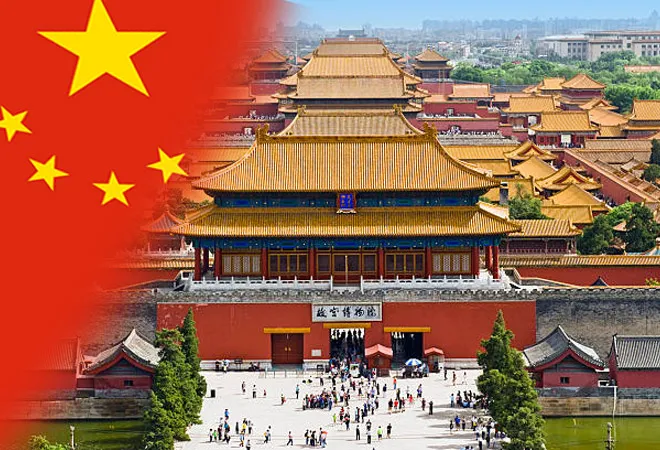-
CENTRES
Progammes & Centres
Location
Does the flurry of European leaders rushing to China mark a recession in trans-Atlantic solidarity?

This is the 141th in the series–The China Chronicles.
One of the most unexpected outcomes of the prolonged Ukraine crisis has been the catapulting of China to the forefront of global diplomacy. Ever since the pandemic-induced restrictions waned, there has been a flurry of global leaders from around the world hurtling to China to carve their own spaces with Beijing in trade, politics, and diplomacy.
In November 2022, Olaf Scholz, the Chancellor of Germany, journeyed to Beijing to hold talks with President Xi Jinping. It had been three years since a European leader had visited China before Scholz's trip. More recently, among prominent leaders visiting China have been Spanish Prime Minister Pedro Sánchez Pérez-Castejón (who visited China in March this year), French President Emmanuel Macron and Brazilian President Luiz Inacio Lula da Silva. While global leaders’ outreach to China can largely be seen as an attempt at carving out their distinctive roles in world politics where maintaining relations with both China and the United States (US) may be necessary albeit for very different reasons, the visits also betray growing space for China as the new broker in town.
The French outreach
The French outreach to China has somewhat rattled the newfound bonhomie which emerged in the Transatlantic relations as a result of the ongoing war in Europe. There are internal as well as external compulsions on France’s part that seem to have contributed to its China outreach, regardless of what it meant for the Transatlantic relations at a time of a compulsive need for war solidarity across the Atlantic. Internally, France is going through a turmoil with the continuous pension protests, which are causing ramifications outside France as well. During a recent state visit to the Netherlands, French President Emmanuel Macron faced protesters who disrupted his speech. Externally, France’s assertion of the ‘European sovereignty’ comprising five pillars of competitiveness, industrial policy, protectionism, reciprocity, and cooperation may be untimely and counterintuitive to the solidarity that Washington seeks from Paris in the context of the strategic compulsions induced by Russia’s actions in Eastern Europe.
The French outreach to China has somewhat rattled the newfound bonhomie which emerged in the Transatlantic relations as a result of the ongoing war in Europe.
For France, Macron’s visit to China was a conscious attempt to prioritise European interests while downplaying, even denigrating, trans-Atlantic ones for several reasons. Although his visit came to be symbolic of collective regional interest in his joint visit to China along with European Commission President Ursula von der Leyen, the French president was clearly playing to China’s gallery. This was reflected most starkly in Macron’s statement on Taiwan: “The question we Europeans are asking ourselves is the following: Is it in our interest to accelerate when it comes to Taiwan? No.” Furthermore, he drew clear lines of demarcation with US’ interests by saying that France should not become a ‘vassal’ of the US and reduce its dependence on the “extraterritoriality of the US dollar.” The French narrative of ‘strategic autonomy’ as enunciated by Macron was music to Xi Jinping’s ears, discernible in the widespread and positive interpretation of the visit.
France has rested the defence of its stance sympathetic to China on feeble grounds of its ‘strategic autonomy’—a strategy which has predictably received thumbs up from China. France’s attempt at cosying up to China may also be seen as a payback to the US for ousting France from a submarine deal with Australia by bringing in the AUKUS deal in 2022. But these steps have run in contravention of the West’s, Russia’s as well as China’s strategies. Yet, causality, a theory in political science, would point to the growing Russia-China axis as a possible factor for Europe acting in its own interest over larger trans-Atlantic goals.
Whither trans-Atlantic solidarity?
Macron’s three-day visit to China may have landed business deals and an upbeat picture of trade in the future for France but it has received scathing and widespread backlash in the trans-Atlantic community, especially in the US.
For the US, these steps mark a recession in trans-Atlantic solidarity. The Biden administration has worked overtime to strengthen relations with European allies after the Trump administration’s damaging policies. The Ukraine crisis in Europe proved the perfect storm for the Biden administration to bring Europe on board in dealing with both China and Russia together—something that Washington cannot do alone. Biden’s strong China stance as depicted through its steps in the tech sector requires a complementary approach from Europe. Increasingly, this is a challenge for European countries as they want to expand their manufacturing and businesses. Germany, for instance, is moving closer to China in the economic space despite the US trying to isolate China economically.
The Ukraine crisis in Europe proved the perfect storm for the Biden administration to bring Europe on board in dealing with both China and Russia together—something that Washington cannot do alone.
Individual leaders of major European countries going their own ways with China may complicate the US’ problems on both the strategic fronts: China and Russia. For the US, Russia has been an unexpected concern since it entered the Ukraine conflict in February 2022, while China remains the long-term strategic challenge as enunciated in all its strategic policy documents including the National Security Strategy and its Indo-Pacific policy. Macron’s comments on a non-escalatory approach to Taiwan may also impede US’ preparations for the coming China challenge. In the shadow of the Ukraine crisis war, Biden’s solidarity with European allies rides on a collective trans-Atlantic isolation of China. The separate Indo-Pacific strategies brought out by some European countries besides the EU strategy in the region also indicate that binding trans-Atlantic compulsions with Indo-Pacific realities may not be easy for the Biden administration. For Biden, the ultimate challenge to achieve a foolproof trans-Atlantic relation that has severed all its ties with China and Russia remains a pipedream, even as the numbers for US’ trade with China itself are rising: the 2022-2023 US imports from China went up 6.3 percent in comparison to 2021-2022.
New broker in town?
For China, a strong economic relationship with European countries is another step in the direction of fighting Washington’s attempts to isolate the former in the technology, economic, and other domains. It has combined its global outreach with attempts at being an honest broker globally. In the recent past, China has declared its arrival on the international scene as a broker of peace globally. In the West Asian region, China has managed to bring Saudi Arabia and Iran—two regional foes—to the table which could usher in a new regional order. The US’ withdrawal from Afghanistan in 2021 provided the strategic space for China to think long term towards its new roles. China’s peace proposal—seen as vague—to end the Ukraine crisis during Xi Jinping’s Moscow visit is aimed more at creating a perception of peace than peace itself.
China’s image as an honest broker remains tainted by its foreign policy tools which induce political, economic, and diplomatic coercion across nations of the world.
The indispensable question which looms large over China’s global diplomatic outreach is whether it can be an honest broker, especially in the light of its own contested sovereignty claims, belligerent behaviour apropos Taiwan and its readiness to embrace non-state actors such as the Taliban in Afghanistan. China’s image as an honest broker remains tainted by its foreign policy tools which induce political, economic, and diplomatic coercion across nations of the world. It often doubles down on this approach with its sovereignty claims in its vast neighbourhood.
China is far from being near the US’ ability to influence global diplomacy in scale and scope but it may have started the groundwork for rapidly catching up with Washington in this direction. While the US has historically used both diplomatic and coercive means to exert influence quite conspicuously with other countries, China’s coercive tactics remain camouflaged, providing Beijing with the advantage of a better image than Washington. Besides, China rides on the advantage imparted by widespread anti-West and anti-colonial sentiments running through the Global South’s domestic political landscape. As the conflict in Europe continues and economic and recessionary compulsions force countries across the world to engage with China economically, Beijing will try to build on both its influence as well as an image makeover.
The views expressed above belong to the author(s). ORF research and analyses now available on Telegram! Click here to access our curated content — blogs, longforms and interviews.

Vivek Mishra is Deputy Director – Strategic Studies Programme at the Observer Research Foundation. His work focuses on US foreign policy, domestic politics in the US, ...
Read More +